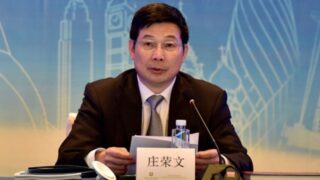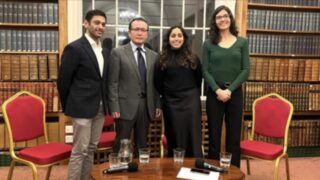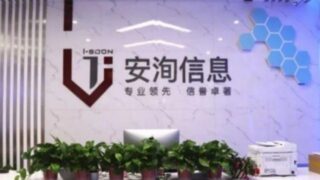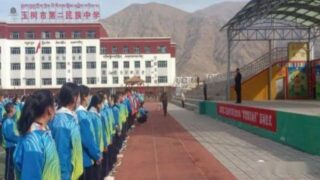Table of Contents
Political studies, restricted speech, and “transformation” tasks: Teachers on assignment in Xinjiang under intense control, causing depression and anxiety.
Table of contents: Endless political studies – Cellphones inspected, speech tightly controlled – “Three Entries, Two Contacts, One Friend-Making”


Teachers from other parts of China assigned to teach in the Xinjiang Uyghur Autonomous Region are reporting oppressive politicization of their jobs, taking them away from teaching and making them into ideological agents.
“The teachers’ point of view is very important and directly affects students’ thinking, so it is imperative that teachers receive political and ideological education,” said the director of teaching at a school in Xinjiang’s Kashi prefecture. “This is a political task.”
Endless political studies
Zhang Li (a pseudonym), a teacher assigned to a school in Xinjiang’s Kashi prefecture, told Bitter Winter that she must inform the director of teaching about what she is planning to do for the day every morning, and she must attend a two-hour meeting every evening.
“At every meeting, they talk about how people aren’t allowed to believe in Islam and must believe in the Communist Party,” said Ms. Zhang. “They say that Uyghurs in Kazakhstan and Xinjiang believe in Islam, and that they want to join forces to make Xinjiang independent. They emphasize the Communist Party’s good policies, and how the Communist Party has prepared a new house for each family and gives each family a subsidy. They repeat these themes, but none of us are willing to listen.”
The teachers also are required to study the core socialist values, the Disciplinary Regulations of the Chinese Communist Party, and so on. After each political studies class, teachers have to write an essay about their gains from the study.
“At the end of each meeting, I always have the urge to resign from my job,” Ms. Zhang said. “I’m not a Party member, but I’m forced to study every day and do the same things as Party members. I feel emotionally repressed.”


Apart from political studies, every Monday, all of the school’s teachers and students must participate in a flag-raising ceremony. All the teachers are required to face the national flag, raise their hand, and swear an oath: “I’m an honorable teacher of the people. I will never participate in activities that divide the country. I will never participate in any religious activities. I will hold high the great banner of Xi Jinping, and fulfill my duty to teach and educate students.”
The school carries out patriotic education over the public address system at random times. Typical content of the lessons could include: “Xinjiang has been part of China’s territory since ancient times. Without the Communist Party, there would be no new China….” When the announcements start, even if they are in the middle of a lesson, all the teachers and students must stop their classes, listen to the report, and take notes. Afterward, the teachers must write an essay of about 500 Chinese characters on the topic. The school arranges for a specially designated person to review such essays written by ethnic Uyghur teachers to observe whether they have any reactionary thoughts.
Cellphones inspected, speech tightly controlled
According to Ms. Zhang, the cellphones of every teacher at the school are monitored. The school inspects teachers’ phones regularly to check whether they contain any sensitive content or whether they have watched any so-called “anti-Party videos” (generally any videos that expose the dark side of society). Teachers are prohibited from viewing any videos or other materials about the Party, the school, or Chinese politics that have not been distributed by the school.
At the same time, the school forces teachers to forward the Party’s political propaganda, policies, regulations, and work information to their WeChat profiles. In particular, Uyghur teachers must send several such WeChat messages every day.
Ms. Zhang revealed that one of her colleagues was arrested and detained for sending some messages complaining about the government.
“If these children in my class show any hint of religion, or if they defend their parents [who are held in transformation through education camps] against injustice, I will be the first person to be implicated,” said Ms. Zhang. “We teachers are indoctrinated with Marxism and aren’t allowed to have our own opinions. We have to obey the Communist Party always. This kind of life is depressing.”
“Three Entries, Two Contacts, One Friend-Making”
A teacher in Kashi prefecture’s Shache county told Bitter Winter that the authorities require teachers to fulfill “Three Entries, Two Contacts, and One Friend-Making” in order “to clear students’ minds and eliminate unstable factors.” The “three entries” means that teachers need to enter the school, enter the cafeteria, and enter the dormitory. The “two contacts” refers to contacting parents and students. The “one friend-making” refers to making friends with students.
Every month, each teacher must meet and take photos with the parents of 12 students. They must record the contents of their conversations and post the images in a booklet that is later submitted to the school for review.
“Teachers should focus wholeheartedly on teaching, not politics,” the teacher said. “But the government believes that mastering the ideological dynamics of Uyghur students is more important than teaching.”
Also, during holidays, teachers are required to join the “home-stay program” – move in with Uyghur families, promote the Communist Party’s policies, and transform their thinking.
In today’s China, even those who answered the high calling to educate the next generation have been co-opted into the surveillance and propaganda state.
Reported by Li Zaili









